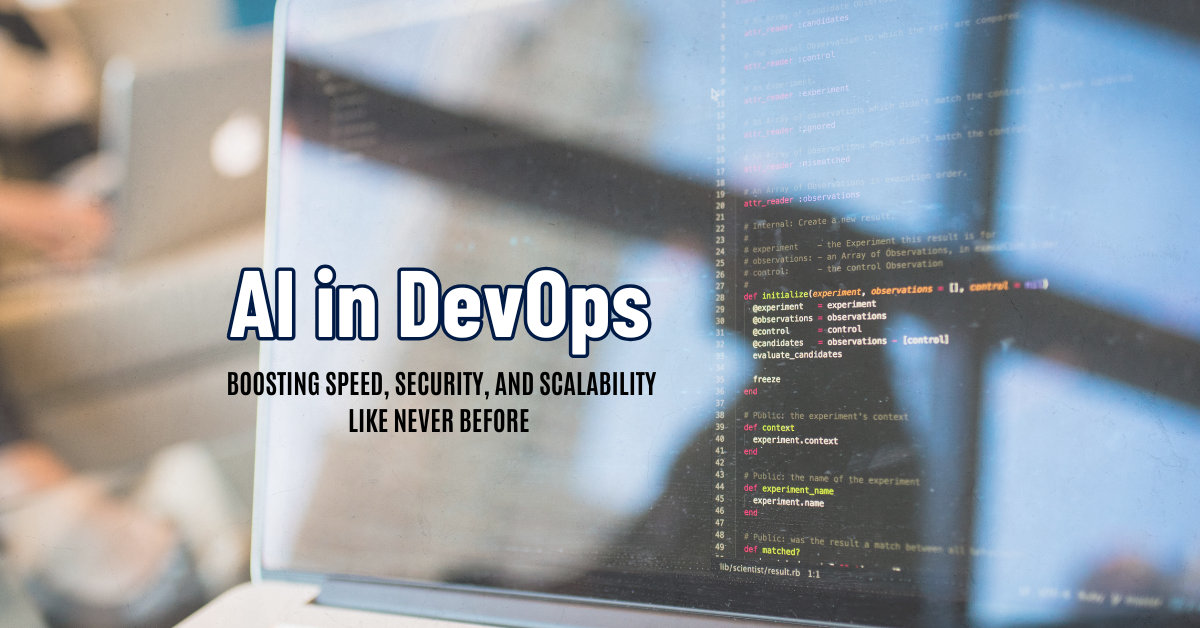AI in DevOps: Boosting speed, security, and scalability like never before
The integration of AI in DevOps is transforming modern businesses. It’s no longer optional—it’s essential. By combining artificial intelligence with DevOps, organizations achieve unmatched efficiency, security, and scalability.
Table of Contents
The role of AI in DevOps
AI in DevOps is transforming traditional workflows. It automates repetitive tasks, reducing human error and freeing up valuable time for developers. This boosts efficiency and accelerates delivery cycles, enabling businesses to respond faster to market demands.
DevOps teams are increasingly relying on AI for DevOps security. By identifying vulnerabilities faster than manual methods, AI ensures safer deployments and more robust systems. This proactive approach minimizes risks and enhances overall system reliability.
DevOps automation with AI
DevOps automation with AI is a game-changer. It effortlessly handles complex processes, from code integration to deployment. By automating these tasks, AI streamlines operations reduce bottlenecks and ensures consistent performance.
One of the most impactful applications in DevOps is predictive analytics using AI. By forecasting potential issues, AI helps teams address problems before they escalate. This minimizes downtime, improves reliability, and ensures smoother operations.
Challenges of integrating AI in DevOps
Despite its benefits, the challenges of integrating AI in DevOps cannot be ignored. Teams often face skill gaps and resistance to change. Proper training and clear communication are essential to overcome these hurdles.
Another significant challenge is data quality. AI systems require accurate and high-quality data to function effectively. Poor data can lead to flawed insights and decisions, undermining the potential of AI in DevOps.
Predictive analytics in DevOps using AI
Predictive analytics in DevOps using AI is reshaping decision-making. AI predicts future outcomes by analyzing historical data, helping teams optimize resources and improve performance.
For example, AI can predict server loads during peak times, allowing teams to scale resources accordingly. This ensures smooth operations and prevents system crashes, enhancing customer satisfaction.
The impact of AI on DevOps speed
AI in DevOps significantly accelerates development cycles. Automated testing and deployment reduce manual intervention, leading to faster application time-to-market.
AI benefits continuous integration and delivery (CI/CD) pipelines immensely. By identifying bottlenecks and optimizing workflows, AI enables teams to deliver updates more frequently and reliably.
Enhancing security with AI in DevOps
AI-powered tools monitor system behavior in real-time, flagging unusual activities such as unauthorized access attempts. This strengthens cybersecurity in DevOps, protecting sensitive data and maintaining customer trust.
In the context of DevOps in modern businesses, these tools ensure continuous monitoring and compliance with industry standards, enabling organizations to stay ahead of evolving threats.
Scalability through AI-driven DevOps
AI in DevOps enables seamless scalability. AI ensures optimal performance during peak loads by predicting resource requirements based on usage patterns.
AI greatly benefits Cloud-based DevOps environments. It automates scaling processes, reducing manual effort and resulting in cost savings and improved efficiency.
Overcoming integration challenges
The challenges of integrating AI in DevOps are significant but manageable. Teams must invest in training and upskilling to use AI tools effectively.
Data management is another critical factor. High-quality data is essential for accurate AI predictions. Businesses must establish robust data governance practices to maximize the benefits of AI in DevOps.
Applications of AI in DevOps
Many organizations are already leveraging AI in DevOps. For example, AI-driven chatbots assist incident management, providing instant solutions to common issues.
Another application is automated code reviews. AI tools analyze code for errors and vulnerabilities, improving code quality and reducing debugging time.
The future of AI in DevOps is bright. AI technology’s applications will expand, driving even greater efficiency and innovation.
Collaboration between AI and human expertise will be key. Together, they will drive the next wave of digital transformation, reshaping industries and redefining business operations.
AI in DevOps is reshaping the tech landscape. It offers unparalleled speed, security, and scalability, making it necessary for modern businesses.
Organizations can unlock its full potential by addressing the challenges of integrating AI in DevOps. The future of DevOps is intelligent, automated, and secure, paving the way for a new era of innovation.
Looking to leverage AI for DevOps success? Connect with Novas Arc and see how AI-driven solutions can enhance your Digital Transformation strategy.
FAQs
- What is AI in DevOps?
AI in DevOps refers to integrating artificial intelligence technologies into DevOps practices to automate tasks, enhance security, and improve decision-making.
- How does AI improve DevOps workflows?
AI automates repetitive tasks, identifies bottlenecks, and optimizes processes, leading to faster development cycles and improved efficiency.
- What are the key benefits of AI in DevOps?
The key benefits include faster delivery, enhanced security, improved scalability, reduced downtime, and better resource management.
- How does AI help in incident management?
AI-driven tools detect anomalies, predict potential issues, and provide instant solutions, enabling faster resolution of incidents.
- Can AI improve software testing in DevOps?
Yes, AI automates testing processes, identifies bugs, and ensures code quality, reducing manual effort and improving accuracy.
- What are some AI-powered tools used in DevOps?
Popular tools include Jenkins for CI/CD, Dynatrace for monitoring, and Snyk for security analysis.
- What are the challenges of using AI in DevOps?
Challenges include skill gaps, resistance to change, data quality issues, and the need for robust governance practices.
Author








